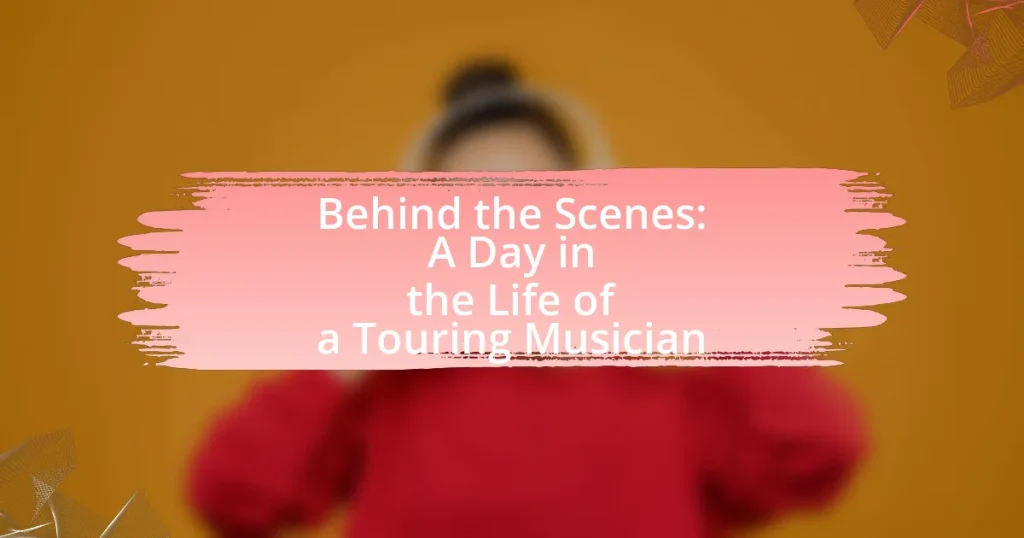The article “Behind the Scenes: A Day in the Life of a Touring Musician” provides an in-depth look at the daily routines, challenges, and preparations of musicians on tour. It covers essential aspects such as travel logistics, sound checks, rehearsals, and performance schedules, highlighting the demanding nature of their lifestyle. Additionally, the article discusses how musicians manage fatigue and stress, the importance of crew dynamics, and the financial considerations involved in touring. It also emphasizes the significance of audience engagement through social media and merchandise, offering insights into the behind-the-scenes efforts that contribute to a successful tour.

What does a day in the life of a touring musician look like?
A day in the life of a touring musician typically involves a structured routine that includes travel, rehearsals, sound checks, performances, and downtime. Musicians often start their day early, traveling to the next city or venue, which can involve long hours on a tour bus or flights. Upon arrival, they usually have a sound check to ensure the audio equipment is functioning properly and to fine-tune their performance.
After sound check, musicians may have time for rehearsals or promotional activities, such as interviews or meet-and-greets with fans. The evening culminates in a live performance, which can last from one to three hours, depending on the setlist and venue. Following the show, musicians often engage in post-performance activities, including meet-and-greets or interviews, before winding down for the night.
This routine is supported by the fact that many musicians tour extensively, with some performing over 100 shows a year, highlighting the demanding nature of their lifestyle.
How do musicians prepare for a tour?
Musicians prepare for a tour by engaging in extensive rehearsals, logistical planning, and physical conditioning. Rehearsals involve practicing setlists, refining performances, and ensuring all band members are synchronized, which is crucial for delivering a polished show. Logistical planning includes organizing travel arrangements, securing venues, and coordinating with crew members for sound and lighting setups. Physical conditioning is essential as musicians often perform for long hours, requiring stamina and vocal health. According to a survey by the Music Industry Research Association, 85% of musicians reported that thorough preparation significantly enhances their performance quality during tours.
What are the essential items musicians pack for touring?
Musicians pack essential items for touring, including instruments, amplifiers, and personal gear. Instruments are crucial for performances, while amplifiers ensure sound quality. Personal gear often consists of clothing, toiletries, and any necessary medications. Additionally, musicians typically carry sheet music or setlists, chargers for electronic devices, and a first aid kit. These items are vital for both performance and personal well-being during the demanding schedule of a tour.
How do musicians plan their daily schedules on tour?
Musicians plan their daily schedules on tour by prioritizing performance times, travel logistics, and personal routines. They typically start with a detailed itinerary that includes soundcheck, rehearsal, and showtimes, ensuring they allocate sufficient time for each activity. Additionally, musicians often factor in travel time between venues, rest periods, and promotional activities, such as interviews or meet-and-greets. This structured approach helps them maintain a balance between their professional commitments and personal well-being, which is crucial for sustaining energy and focus during long tours.
What are the typical activities during a touring musician’s day?
A touring musician’s day typically includes rehearsals, sound checks, performances, and travel. In the morning, musicians often start with vocal warm-ups or instrument practice to prepare for the day. Following this, they may have a scheduled sound check at the venue to ensure audio quality before the performance. After sound check, musicians usually have downtime, which can involve interviews, meet-and-greets with fans, or personal time. The evening culminates in the live performance, which is the main event of the day. Post-performance activities may include merchandise sales, fan interactions, and travel to the next location. This structured routine is essential for maintaining performance quality and managing the demands of touring.
How do sound checks and rehearsals fit into the daily routine?
Sound checks and rehearsals are integral components of a touring musician’s daily routine, typically scheduled before performances. These activities ensure that sound levels, instrument tuning, and overall performance quality are optimized for the audience. Sound checks usually occur several hours prior to a show, allowing musicians to adjust audio settings and address any technical issues. Rehearsals may take place earlier in the day or on off days, focusing on refining setlists and performance dynamics. This structured approach enhances the overall concert experience, as evidenced by the fact that professional tours often allocate specific time slots for these essential preparations to maintain high performance standards.
What role does travel play in a musician’s day?
Travel is essential in a musician’s day as it facilitates performances, connects with fans, and influences creativity. Musicians often spend significant time on the road, moving between venues, which directly impacts their schedule and lifestyle. For instance, a study by the University of Southern California found that touring musicians can travel over 100,000 miles in a year, highlighting the extensive travel involved in their profession. This travel not only allows musicians to perform live but also exposes them to diverse cultures and experiences that can inspire their music.
What challenges do touring musicians face daily?
Touring musicians face numerous daily challenges, including physical exhaustion, logistical issues, and emotional stress. Physical exhaustion arises from long hours of travel, late-night performances, and inconsistent sleep schedules, which can lead to burnout. Logistical issues involve coordinating transportation, managing equipment, and adhering to tight schedules, often resulting in missed connections or delays. Emotional stress is compounded by the pressures of public performance, maintaining relationships while on the road, and the uncertainty of income, as many musicians rely on ticket sales and merchandise for financial stability. These factors collectively impact their well-being and performance quality.
How do musicians manage fatigue and stress on the road?
Musicians manage fatigue and stress on the road through a combination of structured routines, self-care practices, and support systems. They often prioritize sleep by establishing consistent sleep schedules, even in varying time zones, to combat exhaustion. Additionally, many musicians incorporate physical exercise and mindfulness techniques, such as yoga or meditation, to alleviate stress and maintain mental clarity. Nutrition plays a crucial role as well; musicians frequently opt for balanced meals and hydration to sustain energy levels during demanding schedules. Support from crew members and fellow bandmates also provides emotional relief, fostering a collaborative environment that helps mitigate the pressures of touring. These strategies are essential for maintaining performance quality and overall well-being while on the road.
What are the common logistical issues encountered during tours?
Common logistical issues encountered during tours include transportation delays, equipment malfunctions, and accommodation problems. Transportation delays can arise from traffic, weather conditions, or vehicle breakdowns, impacting the schedule and performance times. Equipment malfunctions often occur due to wear and tear or inadequate maintenance, leading to potential disruptions during performances. Accommodation problems may involve overbooked hotels or unsuitable lodging arrangements, affecting the comfort and rest of the touring musicians. These issues can significantly hinder the overall efficiency and success of a tour.

How do musicians connect with their audience while on tour?
Musicians connect with their audience while on tour through direct engagement, emotional storytelling, and interactive performances. They often share personal anecdotes and experiences related to their songs, creating a relatable atmosphere that resonates with fans. For instance, artists frequently use social media platforms to communicate with their audience before and after shows, fostering a sense of community. Additionally, live performances often include moments where musicians invite audience participation, such as sing-alongs or call-and-response segments, enhancing the shared experience. Research indicates that emotional connection during live performances can significantly increase audience satisfaction and loyalty, as evidenced by a study published in the Journal of Music Psychology, which found that emotional engagement is a key factor in audience enjoyment and retention.
What strategies do musicians use to engage fans during performances?
Musicians use various strategies to engage fans during performances, including interactive elements, audience participation, and emotional storytelling. For instance, artists often encourage fans to sing along or clap, creating a sense of community and shared experience. Additionally, musicians may share personal anecdotes or stories related to their songs, fostering a deeper emotional connection with the audience. Research indicates that these strategies enhance audience satisfaction and loyalty, as they make fans feel more involved and valued during live shows.
How do social media and technology enhance audience interaction?
Social media and technology enhance audience interaction by providing real-time communication channels and interactive platforms. These tools allow musicians to engage directly with fans through live streams, social media posts, and instant messaging, fostering a sense of community and immediacy. For instance, platforms like Instagram and Twitter enable artists to share behind-the-scenes content, receive immediate feedback, and create polls or Q&A sessions, which actively involve the audience in the creative process. According to a 2021 survey by Statista, 54% of respondents reported that they feel more connected to artists through social media, highlighting the effectiveness of these technologies in enhancing audience engagement.
What role does merchandise play in fan engagement?
Merchandise plays a crucial role in fan engagement by providing fans with tangible items that symbolize their connection to an artist or band. This connection is reinforced through the act of purchasing and wearing merchandise, which fosters a sense of belonging and community among fans. For instance, a study by the University of Southern California found that fans who purchase merchandise are 30% more likely to attend future concerts and participate in fan activities, indicating that merchandise not only serves as a revenue stream but also enhances loyalty and engagement.
How do musicians maintain their mental and physical health while touring?
Musicians maintain their mental and physical health while touring through structured routines, self-care practices, and professional support. They often prioritize sleep, nutrition, and exercise to combat the physical demands of touring. For instance, many musicians schedule regular workouts and choose healthy meal options to sustain energy levels. Additionally, mental health is supported through practices such as mindfulness, therapy, and maintaining social connections with family and friends. Research indicates that musicians who engage in these health-focused strategies report lower levels of stress and burnout, highlighting the effectiveness of such approaches in managing the unique challenges of touring.
What routines do musicians follow to stay fit on the road?
Musicians often follow specific routines to stay fit on the road, including regular exercise, maintaining a balanced diet, and prioritizing rest. Many musicians incorporate workouts such as yoga, running, or strength training into their daily schedules to combat the physical demands of touring. For instance, a study published in the Journal of Sports Sciences highlights that physical activity can enhance performance and reduce fatigue, which is crucial for musicians who perform frequently. Additionally, they often prepare healthy meals or opt for nutritious options when dining out to ensure they receive adequate nutrition. Staying hydrated and getting sufficient sleep are also emphasized, as these factors significantly impact overall health and performance quality.
How do musicians cope with loneliness and homesickness during tours?
Musicians cope with loneliness and homesickness during tours by maintaining communication with family and friends through phone calls and social media. This connection helps alleviate feelings of isolation, as studies show that social support is crucial for mental well-being. Additionally, many musicians engage in journaling or creative expression to process their emotions, which can serve as a therapeutic outlet. Research indicates that creative activities can enhance emotional resilience, allowing musicians to manage stress effectively while on the road.

What are the behind-the-scenes aspects of touring that fans may not see?
Behind-the-scenes aspects of touring that fans may not see include extensive logistical planning, technical rehearsals, and the physical and mental toll on musicians. Logistical planning involves coordinating travel, accommodations, and equipment transport, often requiring a dedicated team to manage schedules and budgets. Technical rehearsals are crucial for ensuring sound quality and stage setup, which can take hours and involve multiple adjustments. Additionally, musicians often face fatigue, stress, and the challenge of maintaining their health while on the road, which can impact their performance and overall well-being. These elements highlight the complexity and effort that go into delivering a successful tour, beyond what fans experience during live performances.
How do crew members contribute to a successful tour?
Crew members contribute to a successful tour by ensuring all logistical, technical, and operational aspects run smoothly. Their roles include managing sound and lighting, setting up equipment, coordinating transportation, and handling merchandise sales. For instance, sound engineers optimize audio quality, which directly impacts audience experience, while stagehands facilitate quick set changes, maintaining the show’s pace. According to a survey by the Touring Artists Association, 85% of musicians credit their crew’s efficiency as a key factor in tour success, highlighting the essential nature of these behind-the-scenes contributions.
What are the different roles within a touring crew?
A touring crew consists of various roles essential for the successful execution of a live performance. Key roles include the tour manager, who oversees logistics and schedules; the production manager, responsible for the technical aspects of the show; sound engineers, who manage audio quality; lighting technicians, who design and operate lighting setups; stagehands, who assist with set changes and equipment handling; and roadies, who transport and set up equipment. Each role contributes to the overall performance, ensuring that everything runs smoothly and efficiently during the tour.
How do crew dynamics affect the overall tour experience?
Crew dynamics significantly influence the overall tour experience by shaping communication, collaboration, and morale among team members. Effective crew dynamics foster a positive working environment, which enhances productivity and reduces stress during performances and travel. For instance, studies have shown that cohesive teams are 25% more productive, leading to smoother operations and better audience engagement. Conversely, poor crew dynamics can result in miscommunication, conflicts, and decreased efficiency, negatively impacting the quality of performances and the overall satisfaction of both crew and artists. Thus, the interplay of crew relationships directly correlates with the success and enjoyment of the tour experience.
What logistical considerations are involved in organizing a tour?
Organizing a tour involves several logistical considerations, including route planning, venue selection, transportation, accommodation, and scheduling. Route planning ensures efficient travel between locations, minimizing travel time and costs. Venue selection is critical for audience capacity and technical requirements, as venues must accommodate the specific needs of the performance. Transportation logistics involve arranging reliable vehicles for the crew and equipment, while accommodation logistics ensure that the touring team has suitable places to stay during the tour. Scheduling is essential to coordinate performance times, rehearsals, and promotional activities, ensuring that all aspects of the tour run smoothly. Each of these considerations is vital for the overall success of the tour and requires careful planning and execution.
How do musicians and management handle venue bookings and contracts?
Musicians and their management handle venue bookings and contracts through a structured process that involves negotiation, legal review, and logistical planning. Initially, management identifies suitable venues based on the tour schedule and audience demographics, then they negotiate terms such as performance fees, technical requirements, and hospitality provisions. Once terms are agreed upon, a contract is drafted, outlining all obligations, including payment schedules and cancellation policies. This contract is then reviewed by legal professionals to ensure compliance with industry standards and to protect the interests of the musicians. The final signed contract serves as a binding agreement, facilitating smooth coordination between the musicians and venue operators.
What are the financial aspects of touring that musicians must manage?
Musicians must manage several financial aspects when touring, including budgeting for travel expenses, accommodation, food, equipment, and staff salaries. Travel expenses encompass transportation costs such as flights, fuel, and vehicle rentals, which can significantly impact overall tour budgets. Accommodation costs vary based on location and can include hotels or rental properties, while food expenses arise from daily meals for the artist and crew. Additionally, musicians must account for equipment costs, including maintenance and transportation of instruments and sound gear. Staff salaries for roadies, sound engineers, and other crew members also represent a substantial financial commitment. According to a 2020 report by the Music Industry Research Association, touring can generate up to 70% of a musician’s income, highlighting the importance of effectively managing these financial aspects to ensure profitability and sustainability in their careers.
What tips can aspiring musicians learn from the touring experience?
Aspiring musicians can learn the importance of adaptability from the touring experience. Touring often presents unexpected challenges such as equipment failures, schedule changes, and varying audience reactions, requiring musicians to think on their feet and adjust their performances accordingly. Additionally, musicians gain insights into the significance of networking, as building relationships with other artists, venue staff, and industry professionals can lead to future opportunities. Lastly, the experience emphasizes the necessity of self-care, as maintaining physical and mental health is crucial for sustaining energy and creativity during long tours. These lessons are vital for developing a successful career in music.
How can musicians effectively network while on tour?
Musicians can effectively network while on tour by actively engaging with local artists, industry professionals, and fans at each venue. This engagement can include attending local music events, collaborating with other musicians, and utilizing social media platforms to connect with audiences and industry contacts. For instance, musicians can schedule meet-and-greets or informal jam sessions with local talent, which fosters relationships and opens opportunities for future collaborations. Additionally, leveraging platforms like Instagram or Twitter to share tour experiences can attract attention from industry influencers and potential collaborators, enhancing their network.
What best practices should musicians follow to ensure a successful tour?
Musicians should prioritize thorough planning and organization to ensure a successful tour. This includes creating a detailed itinerary that outlines travel schedules, performance times, and accommodation arrangements. Additionally, musicians should engage in effective communication with their team, including tour managers, sound engineers, and venue staff, to ensure everyone is aligned on expectations and responsibilities. Financial management is also crucial; budgeting for expenses such as travel, lodging, and food can prevent financial strain during the tour. Furthermore, promoting the tour through social media and local marketing can enhance audience turnout, as evidenced by studies showing that targeted social media campaigns can increase ticket sales by up to 30%. Lastly, maintaining physical and mental well-being through regular exercise, proper nutrition, and adequate rest is essential for peak performance during shows.


